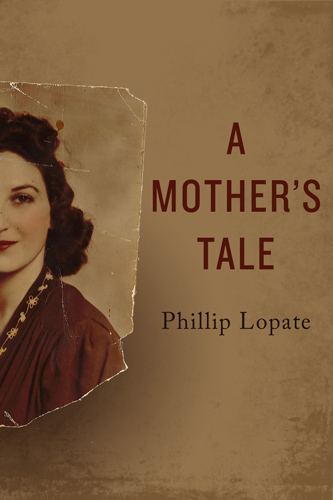A Mother’s Tale
In 1984, Phillip Lopate, then 41, recorded his mother, then 66, tell her life story for 20 hours over three months. He then put the cassette tapes in a shoe box for three decades before he transcribed them. A Mother’s Tale, is the result of this project. Lopate writes in his prologue, “I entered a triangular dialogue involving my mother, my younger self, and the person I am today.” In the final chapter, he summarizes his mother’s life and how his project fits into the larger scheme of America.
In 1984, Phillip Lopate, then 41, recorded his mother, then 66, tell her life story for 20 hours over three months. He then put the cassette tapes in a shoe box for three decades before he transcribed them. A Mother’s Tale, is the result of this project. Lopate writes in his prologue, “I entered a triangular dialogue involving my mother, my younger self, and the person I am today.” In the final chapter, he summarizes his mother’s life and how his project fits into the larger scheme of America:
Listening to and transcribing these tapes, I was impressed by the sweep of my mother’s life—all this woman had gone through. Born to European immigrants into a comfortable middle-class home, she was her parent’s favorite but lost them at such an early age. She was raised by strict, indifferent siblings, a runaway and a high school dropout. She was forced to reinvent herself over and over: working at a beauty parlor, becoming a housewife and mother, running a candy store, working at war factories, starting a photography business and camera store, clerking for garment companies, going into show business, touring America, doing commercials, going back to school. [ . . . ] It was a twentieth century life. Born in 1918, died in 2000, she began to seem to me a representative of millions of women who had passed through the same time period: the end of World War I, the Depression, the New Deal, World War II, the Korean War, the civil rights movement, Vietnam and the antiwar movement, gay rights, feminism. Her very discontent seemed emblematic of millions of other women’s experience or so I have told myself, while working on the book, trying to quiet the carping voice that said: Who’s going to care about your mother enough to want to read it?
Well, I did. Not because Lopate is at the top of his game. Not because it is a prime example of memoir. Not because the balance between reflection, research, and storytelling blend together to form a textbook example of engaging creative nonfiction. Not because Lopate’s mother could be seen a paradigm. But because Frances Lopate is such an extraordinarily blunt and larger-than-life personality. She was old school New York with a penchant for survival, re-telling gossip and all the neurotic inclinations of a Jewish-mother trying to pull one last fast one over her son.
One-liners such as, “The only thing I ever got out of your grandfather was aggravation. And an allergy.” Or, “If you could say a woman was a nymphomaniac, your father was a nymphomaniac. God, that pecker of his was at half-mast most of the time. Full mast a lot of the time. The only reason I didn’t get pregnant on the honeymoon was that we went through a lot of Trojans.” Lopate and his mother are not afraid to go into intimate details. Much of the book recounts the unhappiness in his parents’ marriage. She describes her affairs in extreme detail, her attempts to leave Lopate’s father, and blames the marriage for all the errant choices in her life. Lopate interacts and provokes as interviewer then reflects insightfully from a distance of 20 years as steady-handed writing teacher.
“[I]t seems like my whole life has been one series of blackmails after another. I felt he blackmailed me into staying with him, and that changed my life; it was not fulfilled. I thought when you kids were old enough, I’d be able to get out of it, he trapped me again! He had that fucking—phoney stroke that wasn’t even a stroke. But what the hell.”
Needless to say, there was nothing phoney about my father’s stroke. It was genuinely incapacitating, and he never regained his full strength afterwards. I have no idea what might have been going through my mother’s head when she put forth this strange assertion.
Contradiction. Blame. Guilt. Freudian. Gossip-laced invective and humor—Lopate gives a skilled writer’s honest attempt to reckon with family. The book climaxes with a soul-searching, heart-jarring argument between son (“I needed you as a mother.”) and mother (“You rejected me as a mother.”). Lopate’s mother feels used by the writer for the sake of literary fodder. Lopate seeks an explanation for a “certain coldness” that kept them locked in battle. Lopate’s mother gets the final word during the interview, “The truth is rejection. Love is not the truth.” Lopate has three decades to reflect, reject and ponder. “Maybe I had staged this whole set of interviews just to get to the bottom of our mutual mistrust. If so, I had been only partially successful.”
Not only is A Mother’s Tale a backstage no-holds-barred view to one family’s internal drama, full of grudges, intrigue and back-stabbing. It is also a historical guide to New York, from The Lower East Side to The Catskills, from Williamsburg to Mid-town. Traversing not only the neighborhoods but sliding from middleclass immigrant status to lower-class citizenship. Lopate’s honesty, vulnerability, and literary skills have produced a multi-layered narrative that cuts to the core and confirms Czeslaw Milosz’s proclamation, “when a writer is born into a family, the family is finished.”





